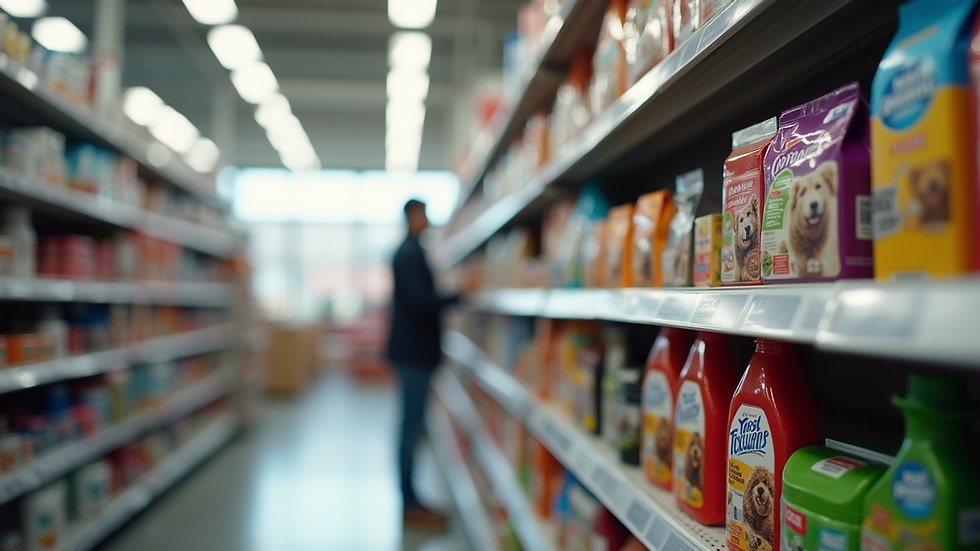Is Your Dog's Food a No-Go? Here Are 5 Signs It’s Time for a Change
- Teresa Kay

- May 6, 2025
- 3 min read
Finding the right food for your dog can feel overwhelming. With countless options available at local pet stores and online, how do you ensure your furry friend is getting the nutrition they need? Just like people, dogs have unique dietary needs, and sometimes, their food might not be suitable for them. If you’re wondering whether your dog's food is doing more harm than good, here are five clear signs that it may be time for a change.

1. Changes in Digestion
One of the first signs that your dog’s food may not be right for them can be found in their bowel movements. If your dog experiences persistent diarrhoea, constipation, or notably foul-smelling poop, it’s time to take note. According to veterinary studies, around 30% of dogs experience digestive issues related to their diet. These problems can arise from foods that are too rich, contain indigestible ingredients, or indicate a food intolerance.
For example, if you notice your dog becoming gassy or showing discomfort after meals, you might consider switching to a food designed for sensitive stomachs. Look for high-quality dog food that emphasises digestibility and lists wholesome ingredients, with a focus on fibre-rich options.
2. Dull Coat and Skin Issues
A healthy dog should have a shiny, vibrant coat. If you notice your dog's fur becoming dull, brittle, or if they are losing fur more than usual, it could signal a dietary issue. Nutritional deficiencies often show up as skin irritations, excessive itching, or dry, flaky skin.
To combat this, opt for dog foods rich in omega fatty acids, vitamins, and minerals. Ingredients like salmon, flaxseed, and sweet potatoes can contribute to a healthy coat. For example, a diet that includes 10% or more omega-3 fatty acids can significantly enhance fur quality and reduce skin problems.
3. Weight Fluctuations
Keeping a consistent, healthy weight is vital for your dog’s overall well-being. If your dog seems to be fluctuating in weight—whether gaining or losing—despite regular feeding schedules, the quality of their food could be a factor. Data shows that half the dogs in the UK are overweight, leading to various health complications.
Keep track of your dog’s food intake and discuss any sudden weight changes with your veterinarian. They may recommend adjustments, such as reducing portions or transitioning to a food that specifically meets your dog’s caloric and nutritional needs.
4. Decreased Energy Levels
Dogs are known for their boundless energy. If your once-vibrant pup appears lethargic or less playful, this could be linked to their diet. Low-quality food can drain a dog’s energy, leaving them uninterested in play or walks.
You may want to re-evaluate the type of food you are providing. Upgrading to a high-quality, balanced diet tailored to your dog's age, breed, and activity level can have beneficial effects. Look for food options that emphasise protein and complex carbohydrates, which can help sustain energy throughout the day.
5. Behavioural Changes
Sometimes, what happens on the outside reflects what’s going on inside. Changes in behaviour, such as increased anxiety, aggression, or signs of discomfort, can often be diet-related. Food allergies, for instance, can lead to irritability or discomfort, affecting your dog’s mood.
If you encounter these behavioural changes, consult with your veterinarian to explore whether certain food ingredients might be causing a reaction. Transitioning to a hypoallergenic or limited-ingredient dog food may improve your dog’s temperament and overall behaviour.
Final Thoughts
Choosing the right dog food plays a crucial role in ensuring your furry friend remains happy and healthy. If you notice any of these key signs—digestion issues, a lackluster coat, weight fluctuations, decreased energy levels, or behavioural changes—it may be time to consider new food options.
Always worth consulting with either a pet food professional or vet if you are unsure about making significant dietary changes. They can provide guidance on meeting your dog’s specific nutritional needs. Your pup deserves the best nutrition possible, so if your current food isn't serving them well, don’t hesitate to make a necessary change.
While finding the perfect dog food may take some time, discovering what works best for your dog can lead to a healthier, happier life together. Here’s to providing the best nutrition for your furry companion!




Comments